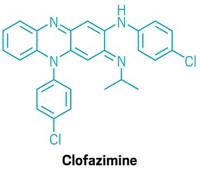Advertisement
Grab your lab coat. Let's get started
Welcome!
Welcome!
Create an account below to get 6 C&EN articles per month, receive newsletters and more - all free.
It seems this is your first time logging in online. Please enter the following information to continue.
As an ACS member you automatically get access to this site. All we need is few more details to create your reading experience.
Not you? Sign in with a different account.
Not you? Sign in with a different account.
ERROR 1
ERROR 1
ERROR 2
ERROR 2
ERROR 2
ERROR 2
ERROR 2
Password and Confirm password must match.
If you have an ACS member number, please enter it here so we can link this account to your membership. (optional)
ERROR 2
ACS values your privacy. By submitting your information, you are gaining access to C&EN and subscribing to our weekly newsletter. We use the information you provide to make your reading experience better, and we will never sell your data to third party members.
Infectious disease
Covid-19
How susceptible is your cat or dog to the novel coronavirus?
Cats can transmit SARS-CoV-2 to one another, but the virus replicates poorly in dogs, pigs, chickens, and ducks, study finds
by Bethany Halford
April 10, 2020

As COVID-19 keeps people at home under quarantine, many have wondered how susceptible their canine and feline companions are to the disease. Now, scientists report that SARS-CoV-2, the virus that causes COVID-19, doesn’t do a good job of copying itself in dogs, pigs, chickens, and ducks. But cats are susceptible to the virus, and cats can give it to one another via airborne transmission. The researchers did not study whether cats could pass the virus to people.
Led by Hualan Chen and Zhigao Bu, of the Harbin Veterinary Research Institute, and Guizhen Wu, of China’s National Institute for Viral Disease Control and Prevention, the team also found that ferrets—animals commonly used to study viruses that cause human respiratory infections—can also get SARS-CoV-2. In ferrets, though, the virus reproduces itself only in their upper respiratory tracts, not in their lungs. The findings could mean that ferrets aren’t great for models for replicating SARS-CoV-2-associated pneumonia in people but could still be good models for testing antiviral drugs and vaccines meant to reduce or even stop virus replication (Science 2020, DOI: 10.1126/science.abb7015).
The study comes after several news reports of pets infected with SARS-CoV-2. In February and March two dogs in Hong Kong, a 17-year-old Pomeranian and a 2-year-old German shepherd, tested positive for SARS-CoV-2. The Pomeranian died a few days after being released from quarantine. But the dog had health problems, and its owner didn’t consent to an autopsy to determine the cause of death. The German shepherd had no symptoms. Both dogs were companions of people with COVID-19. Also in March, two cats in Belgium and Hong Kong tested positive for the virus. The Hong Kong cat was not sick, but the Belgian cat showed symptoms of the disease, including difficulty breathing and diarrhea.
Support nonprofit science journalism
C&EN has made this story and all of its coverage of the coronavirus epidemic freely available during the outbreak to keep the public informed. To support us:
Donate Join Subscribe
It’s not unusual for a virus to cause disease in one species but not another, says Thijs Kuiken, who studies infectious diseases in animals and people at the Netherlands-based medical center Erasmus MC. “In any infectious disease that infects multiple species you see this phenomenon,” he says. “It’s not very well understood.”
Differences in susceptibility could arise from differences in the receptors the virus uses to attach to cells, Kuiken notes. So for instance, the receptor that the virus latches onto in cats might be chemically quite different in dogs. Or it could be because one species has a stronger innate immunity to the disease. For example, ducks can have influenza but not be sick from the virus, whereas chickens tend to get quite ill from the flu.
But Kuiken says that people probably don’t need to worry about getting COVID-19 from their cats. He points out that two cats have tested positive (only one of which was sick) but that more than 100,000 people have tested positive. “The thing that you need to be concerned about is contact with other human beings,” he says.
The authors of the Science paper note that cats should be monitored as part of eliminating COVID-19 in people. Kuiken says that it’s theoretically possible cats could become a reservoir for the virus, but he thinks it’s unlikely. The virus needs hosts that live in groups for survival, which means, he says, domestic cats that often live in homes individually or in pairs “are not the best potential reservoir for this virus.”
The American Veterinary Medical Association recommends that pet owners practice good hygiene and wash their hands before and after handling animal food and waste. The organization encourages people who are ill with COVID-19 to restrict contact with pets and other animals—just as they would with people.





Join the conversation
Contact the reporter
Submit a Letter to the Editor for publication
Engage with us on Twitter